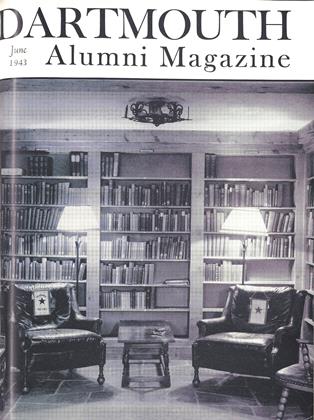FOUR NEW WAR courses have been announced by the College to be given with the start of the revised three-term schedule in July. Two of these courses"Oral and Written English for Naval Students" and "Naval World Geography"have special application to the Navy V-12 Unit which begins at the same time; and along with all other war courses and the liberal arts courses of the regular Dartmouth curriculum they will be open to election by all V-is trainees above the entering freshman class, as well as by civilian students. The other two courses deal with "Colloquial Chinese" and "The Russian Revolution."
The Naval English course, somewhat similar to the course prescribed for all V-12 freshmen, will give training in oral and written expression to students who have completed freshman English at Dartmouth or elsewhere. Special needs of wartime communication will receive primary em- phasis, and oral expression will be taught by assisting members of the Department of Public Speaking. Prof. Anton A. Raven will direct the course.
The new Geography course is designed "to give student Naval officers a knowledge of the geography of the oceans and adjacent lands, an understanding of the location and character of the traffic of peace and wartime trade routes and ports, as well as an insight into the contrasting political and economic (including shipbuilding industries) policies of maritime and continental nations." It will be open to all classes and will be taught by Profs. Albert S. Carlson and Trevor Lloyd.
"Colloquial Chinese," taught by Profs. David Lattimore and Wing-tsit Chan, is a course intended for men who have neither the time nor the inclination to undertake the study of the very difficult Chinese system of writing, but may wish to be able to ask and answer simple questions in everyday Chinese. Everything about the course will be of a strictly practical nature.
"The Russian Revolution" will be taught by Dr. Dmitri von Mohrenschildt, Visiting Lecturer in Russian Civilization, and will trace "first, the development of the revolutionary movement in Russia from its inception in the second half of the 19th century to its culmination in the Communist Revolution of 1917; secondly, it will survey systematically the social, political and cultural evolution of the Soviet state to the present time."
 View Full Issue
View Full Issue
More From This Issue
-
 Article
Article'Round the Girdled Earth
June 1943 By Dick Paul '41 -
 Article
ArticleMOUNTAIN TWILIGHT
June 1943 By LT. CHARLES B. MCLANE,'41 -
 Class Notes
Class Notes1937
June 1943 By JOHN H. DEVLIN JR., FREDERICK K. CASTLE -
 Class Notes
Class Notes1918
June 1943 By ERNEST H. EARLEY, RICHARD A. HOLTON -
 Article
ArticleWar Training and Education
June 1943 -
 Article
ArticleAlumni Council Meeting
June 1943







